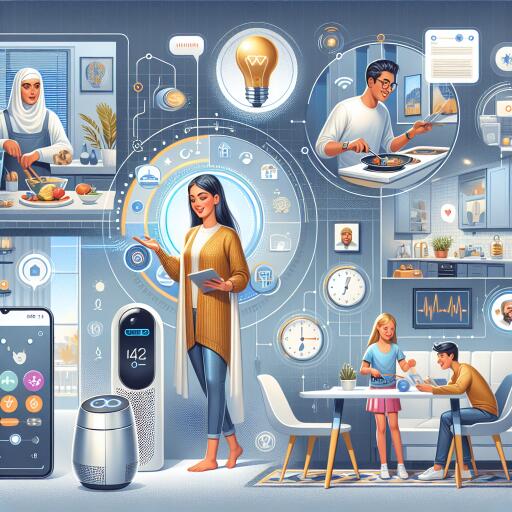The Evolution of Home Automation Through AI
In the rapidly advancing realm of technology, artificial intelligence (AI) has become a cornerstone in revolutionizing how we interact with our living environments. As we stand on the brink of a new decade, the integration of AI in home automation heralds a transformation, making our homes not just places of comfort but intelligent spaces that enhance the quality of life. This narrative explores the spectacular journey of AI in smart home automation and its profound impact on daily living.
Imagine a world where your home not only understands you but anticipates your needs, learning from your habits and preferences to create a living experience that’s uniquely tailored to you. This is no longer the stuff of science fiction, thanks to the leaps and bounds by which AI and machine learning technologies have evolved. By embedding intelligence into our homes, we unlock a new dimension of convenience, safety, and efficiency, setting the stage for a future where our living spaces become extensions of ourselves.
At the heart of smart home automation is the orchestration of various devices and systems—from lighting and temperature control to security and entertainment—all seamlessly connected through AI. This interconnectedness allows for a level of automation where your home not only responds to your commands but also anticipates your needs, making life easier and more enjoyable.
The applications of AI in home automation are as diverse as they are remarkable. Lighting systems that adjust based on natural light conditions, entertainment setups that know your preferences, or security solutions that recognize family members are just the tip of the iceberg. These intelligent systems harness the power of AI to learn and adapt, offering personalized experiences that redefine the meaning of home.
Security and safety have seen significant advancements with AI integration. From facial recognition technologies in door cameras to smart locks that can be controlled remotely, AI has empowered homeowners with tools that not only enhance security but provide peace of mind. Similarly, AI-enabled smoke detectors now offer advanced features such as pinpointing the exact location of a fire, thereby enabling quicker and more effective responses.
Energy management is another area where AI plays a pivotal role. Through intelligent thermostats and energy storage systems, AI optimizes the use of resources, leading to not only cost savings but also a reduced environmental footprint. These smart systems can analyze usage patterns, adjust settings for maximum efficiency, and even tap into renewable energy sources, illustrating how technology can work hand in hand with sustainability.
AI’s influence extends beyond mere convenience to impact financial management within the home. Through automation and intelligent scheduling, AI helps streamline household tasks and energy consumption, leading to significant time and cost savings. This transforms the traditional household into a smart ecosystem, where efficiency and intelligence coalesce to create a more connected and sustainable living experience.
As we look to the future, the possibilities of AI in smart home automation are boundless. From enhancing comfort and security to optimizing energy use and reducing environmental impact, AI is not just transforming our homes but how we live. It’s paving the way for a smarter, more connected world, where our homes understand and cater to our deepest needs and preferences, heralding a new era of intelligent living.
Embracing AI in home automation is not just about adopting new technologies; it’s about making a leap into the future—a future where our homes are not just places we live in but intelligent companions that enrich our lives in every conceivable way. As we continue to explore and expand the boundaries of what’s possible with AI, one thing is clear: the smart home revolution is just getting started, promising an exciting, transformative journey ahead.










